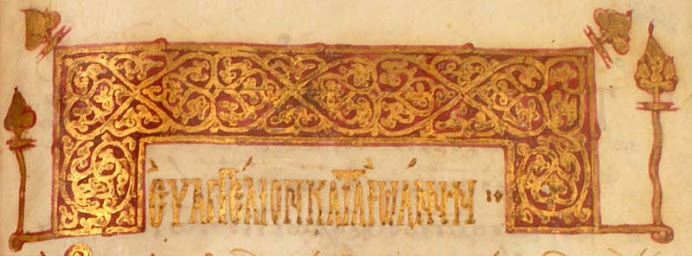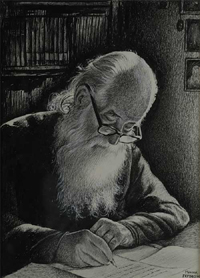
I began this post with the question of why St Symeon is called the “New Theologian.” It has been my argument, following Archbishop Basil, that the sobriquet can be taken two ways. Those speaking from within the Orthodox tradition, such as Archbishop Basil, Bishop Hilarion, and Hieromonk Alexander, have tended to explain the title as pointing towards St Symeon’s renewal of the spiritual life and explain his seemingly novel insistence on the importance of the vision of divine light and explain his seemingly novel insistence on the importance of the vision of divine light (along with the corollary insistence on obedience to the spiritual father) as wholly within the tradition. Another way the title of “New Theologian” can be taken is as referring to a genuine novelty. Here we found an argument for novelty in three articles by Fr John Anthony McGuckin who, in detaching St Symeon from a “global ‘synthesising hermeneutic” and placing him within the eleventh century, asserts that St Symeon was unrepresentative of Byzantine monasticism and furthered a program of reform based on his appeal to his own mystical experiences.
These two very different appreciations of St Symeon’s “newness” come from approaching the saint from two very different perspectives. Those who begin with a “golden chain” of an unbroken monastic Tradition tend to place St Symeon as one of the newer in the chain. Those looking at St Symeon exclusively within his historical context will tend to see novelty in comparison to the Church of his day and will insist that St Symeon is without direct precedent. I would further contend that the former approach, with its emphasis on St. Symeon’s grounding in Tradition, likely corresponds to that of his original disciples, while those who used the title “New Theologian” ironically may well have viewed him much as Fr McGuckin does.
These two very different appreciations of St Symeon’s “newness” come from approaching the saint from two very different perspectives. Those who begin with a “golden chain” of an unbroken monastic Tradition tend to place St Symeon as one of the newer in the chain. Those looking at St Symeon exclusively within his historical context will tend to see novelty in comparison to the Church of his day and will insist that St Symeon is without direct precedent. I would further contend that the former approach, with its emphasis on St. Symeon’s grounding in Tradition, likely corresponds to that of his original disciples, while those who used the title “New Theologian” ironically may well have viewed him much as Fr McGuckin does.









2 comments:
I have been wrestling with some of these issues in a conversation concerning the proposed canonization of Abp Arseny of Winnipeg (founder of St. Tikhon's Monastery in PA).
Looking solely at surviving historical documents one can come to the conclusion that would tend to lean towards him being guilty of sexual immorality. However, were the Church to be assured of Abp Arseny's current status as a saint in heaven interceding for us, my contention is that this is proof that an Orthodox Christian can add to other, more terrestrial evidence in interpreting events. That is, knowing he is a saint we can conclude he is either innocent or repented of his sins.
The same also seems to be true of the believing and unbelieving Jews of the Apostles' day. The Apostles believed Jesus was the Christ because they saw him crucified, dead and buried, and the Resurrected to new life. This was proof added to the otherwise difficult to understand OT prophecies about the Messiah. That is, taking prophecy alone, one would not necessarily (or readily, if at all) come to the conclusion that the Messiah would be or act like Jesus Christ. However, his life, death and resurrection revealed the proper, true meaning of the Old Testament 'facts'.
Post a Comment